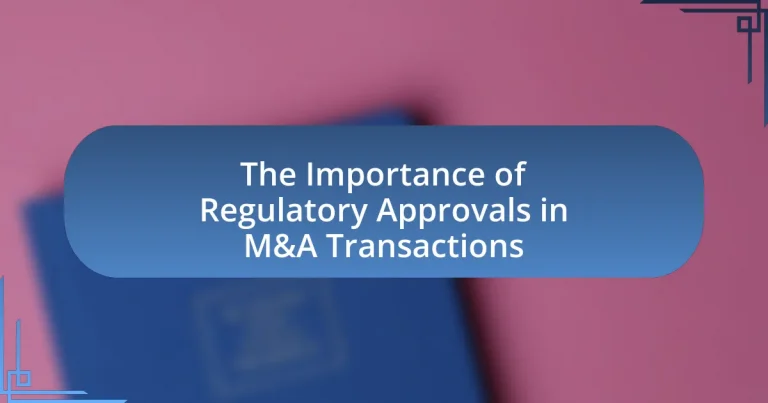Regulatory approvals are essential authorizations required from government agencies during mergers and acquisitions (M&A) to ensure compliance with legal and antitrust regulations. This article outlines the significance of these approvals in maintaining market competition and consumer welfare, detailing the roles of regulatory bodies such as the Federal Trade Commission and the Department of Justice in the United States. It discusses the impact of regulatory approvals on the M&A timeline, the types of approvals needed, and the various regulatory frameworks governing transactions. Additionally, the article highlights the consequences of failing to obtain these approvals, strategies for navigating the approval process, and best practices for ensuring compliance, ultimately emphasizing the critical role of regulatory oversight in shaping successful M&A outcomes.

What are Regulatory Approvals in M&A Transactions?
Regulatory approvals in M&A transactions are the necessary authorizations required from government agencies to ensure that a merger or acquisition complies with legal and antitrust regulations. These approvals are crucial as they assess the potential impact of the transaction on market competition and consumer welfare. For instance, in the United States, the Federal Trade Commission and the Department of Justice evaluate mergers under the Clayton Act and the Sherman Act to prevent anti-competitive practices. Failure to obtain these approvals can lead to legal challenges, fines, or the unwinding of the transaction, highlighting their significance in the M&A process.
Why are Regulatory Approvals necessary in M&A Transactions?
Regulatory approvals are necessary in M&A transactions to ensure compliance with antitrust laws and protect market competition. These approvals help prevent monopolistic practices that could harm consumers and the economy. For instance, the Federal Trade Commission (FTC) and the Department of Justice (DOJ) in the United States review proposed mergers to assess their potential impact on competition. Historical cases, such as the blocked merger between AT&T and T-Mobile in 2011, illustrate the importance of regulatory scrutiny in maintaining fair market conditions.
What role do regulatory bodies play in M&A Transactions?
Regulatory bodies play a crucial role in M&A transactions by ensuring compliance with laws and protecting market competition. These entities, such as the Federal Trade Commission in the United States or the European Commission in the EU, review proposed mergers and acquisitions to assess their potential impact on competition and consumer welfare. For instance, in 2020, the European Commission blocked the merger between Siemens and Alstom, citing concerns over reduced competition in the rail sector. This demonstrates how regulatory bodies actively prevent anti-competitive practices and maintain market integrity, thereby influencing the structure and dynamics of M&A activities.
How do regulatory approvals impact the timeline of M&A Transactions?
Regulatory approvals significantly extend the timeline of M&A transactions by introducing mandatory review processes that can take several months to years. These approvals are required to ensure compliance with antitrust laws and other regulations, which aim to prevent monopolistic practices and protect market competition. For instance, the Federal Trade Commission (FTC) in the United States can take up to 30 days to review a merger, but this period can be extended if further investigation is deemed necessary. Additionally, complex transactions may require approvals from multiple regulatory bodies across different jurisdictions, further complicating and lengthening the timeline. Historical data shows that M&A deals facing regulatory scrutiny often experience delays; for example, the merger between AT&T and Time Warner faced a lengthy approval process that lasted over a year due to antitrust concerns.
What types of Regulatory Approvals are required in M&A Transactions?
Regulatory approvals required in M&A transactions typically include antitrust clearance, foreign investment review, and sector-specific licenses. Antitrust clearance is necessary to ensure that the merger does not create monopolistic practices, as mandated by competition authorities like the Federal Trade Commission in the U.S. Foreign investment review is conducted to assess national security risks, often overseen by committees such as the Committee on Foreign Investment in the United States (CFIUS). Additionally, certain industries, such as telecommunications or banking, may require specific licenses or approvals from regulatory bodies to ensure compliance with sector regulations. These approvals are critical to prevent legal challenges and ensure the transaction aligns with public interest and regulatory standards.
What are the different regulatory frameworks governing M&A Transactions?
The different regulatory frameworks governing M&A transactions include antitrust laws, securities regulations, and industry-specific regulations. Antitrust laws, such as the Sherman Act in the United States, aim to prevent anti-competitive practices and ensure market competition. Securities regulations, enforced by agencies like the Securities and Exchange Commission (SEC), require disclosure of material information to protect investors during the transaction process. Additionally, industry-specific regulations may apply, such as those governing telecommunications or banking sectors, which impose further scrutiny on M&A activities to maintain stability and compliance within those industries. These frameworks collectively ensure that M&A transactions do not harm competition or violate investor protections.
How do international regulations affect cross-border M&A Transactions?
International regulations significantly impact cross-border M&A transactions by establishing legal frameworks that govern the approval processes, compliance requirements, and potential antitrust issues. These regulations vary by jurisdiction and can influence the speed and feasibility of transactions; for instance, the European Union’s Merger Regulation requires that mergers be assessed for their competitive effects, which can lead to lengthy investigations and conditions for approval. Additionally, regulations such as the Foreign Investment Risk Review Modernization Act (FIRRMA) in the United States impose national security reviews on foreign investments, potentially blocking or delaying transactions deemed harmful to national interests. Thus, adherence to international regulations is crucial for successful cross-border M&A, as non-compliance can result in fines, legal challenges, or transaction cancellations.

How do Regulatory Approvals influence M&A Transaction outcomes?
Regulatory approvals significantly influence M&A transaction outcomes by determining whether a merger or acquisition can proceed based on compliance with legal and antitrust standards. These approvals can lead to delays, modifications, or even cancellations of transactions if regulators identify potential anti-competitive concerns or violations of laws. For instance, in 2020, the merger between T-Mobile and Sprint faced extensive scrutiny from the Federal Communications Commission and the Department of Justice, ultimately resulting in a revised agreement to address regulatory concerns. Thus, the regulatory landscape directly impacts the feasibility and structure of M&A deals, shaping the strategic decisions of companies involved.
What are the potential consequences of failing to obtain Regulatory Approvals?
Failing to obtain regulatory approvals can lead to significant legal and financial consequences for companies involved in mergers and acquisitions. Without these approvals, transactions may be deemed illegal, resulting in penalties, fines, or even the unwinding of the deal. For instance, the Federal Trade Commission (FTC) can block mergers that violate antitrust laws, as seen in the case of the proposed merger between AT&T and Time Warner, which faced extensive regulatory scrutiny. Additionally, companies may suffer reputational damage, loss of investor confidence, and potential litigation from stakeholders. These consequences underscore the critical role of regulatory approvals in ensuring compliance and protecting business interests during M&A transactions.
How can lack of approvals lead to legal challenges in M&A Transactions?
Lack of approvals can lead to legal challenges in M&A transactions by creating grounds for regulatory scrutiny and potential litigation. When a merger or acquisition proceeds without necessary approvals from regulatory bodies, it may violate antitrust laws or other legal requirements, resulting in investigations or lawsuits. For instance, the Federal Trade Commission (FTC) or the Department of Justice (DOJ) may challenge the transaction, claiming it harms competition. Historical cases, such as the failed merger between AT&T and T-Mobile in 2011, illustrate how lack of regulatory approval can lead to significant legal hurdles, including the abandonment of the deal due to antitrust concerns. Thus, obtaining all required approvals is crucial to mitigate the risk of legal challenges in M&A transactions.
What financial implications arise from delayed or denied Regulatory Approvals?
Delayed or denied regulatory approvals can lead to significant financial implications for companies involved in mergers and acquisitions. These implications include increased costs due to prolonged transaction timelines, potential loss of competitive advantage, and diminished shareholder value. For instance, a study by PwC found that delays in regulatory approvals can extend the average time to close a deal by 30% or more, resulting in additional legal and advisory fees that can reach millions of dollars. Furthermore, if a deal is denied, companies may face substantial write-offs related to sunk costs and lost opportunities, which can negatively impact their financial statements and market perception.
How do companies navigate the Regulatory Approval process in M&A Transactions?
Companies navigate the Regulatory Approval process in M&A Transactions by conducting thorough pre-merger assessments, engaging with regulatory bodies early, and preparing comprehensive documentation to address potential antitrust concerns. This proactive approach allows companies to identify regulatory hurdles and align their strategies accordingly. For instance, in the United States, the Hart-Scott-Rodino Antitrust Improvements Act requires companies to file pre-merger notifications with the Federal Trade Commission and the Department of Justice, which helps in assessing the competitive implications of the merger. By understanding and complying with these regulatory requirements, companies can streamline the approval process and mitigate delays or rejections.
What strategies can companies employ to expedite Regulatory Approvals?
Companies can expedite regulatory approvals by implementing proactive engagement strategies with regulatory agencies. This includes early and continuous communication to clarify requirements, which can significantly reduce delays. For instance, companies that submit pre-filing meetings with regulators often receive guidance that streamlines the approval process. Additionally, employing experienced regulatory consultants can enhance the quality of submissions, ensuring compliance with all necessary regulations. Historical data shows that firms utilizing these strategies often experience a 30% faster approval timeline compared to those that do not.
How can legal counsel assist in the Regulatory Approval process?
Legal counsel can assist in the Regulatory Approval process by providing expertise in navigating complex legal frameworks and ensuring compliance with applicable regulations. They analyze the specific requirements of regulatory bodies, prepare necessary documentation, and facilitate communication between the parties involved and regulatory authorities. Legal counsel also helps identify potential legal risks and develop strategies to mitigate them, ensuring that all aspects of the transaction adhere to legal standards. Their involvement is crucial in expediting the approval process and minimizing the likelihood of delays or rejections, as evidenced by the fact that companies with legal counsel often experience smoother regulatory interactions, leading to faster approvals.

What best practices should companies follow regarding Regulatory Approvals in M&A Transactions?
Companies should conduct thorough due diligence and engage with regulatory authorities early in the M&A process to ensure compliance with legal requirements. Early engagement allows companies to identify potential regulatory hurdles and address them proactively, which can streamline the approval process.
Additionally, companies should prepare comprehensive documentation that clearly outlines the transaction’s rationale, benefits, and potential impacts on competition, as this information is often required by regulatory bodies. For instance, the Federal Trade Commission (FTC) and the Department of Justice (DOJ) in the United States evaluate mergers based on their effects on market competition, making it essential for companies to present a strong case for their transaction.
Furthermore, companies should establish a dedicated team to manage regulatory submissions and communications, ensuring that all necessary information is accurately provided and that responses to regulatory inquiries are timely. This approach minimizes delays and enhances the likelihood of obtaining approvals without significant obstacles.
Lastly, companies should stay informed about changes in regulatory frameworks and precedents, as these can influence the approval process. For example, the evolving standards for antitrust reviews in various jurisdictions necessitate that companies remain adaptable and responsive to regulatory expectations.
How can companies ensure compliance with regulatory requirements?
Companies can ensure compliance with regulatory requirements by implementing a robust compliance management system that includes regular audits, employee training, and up-to-date knowledge of relevant laws. A compliance management system helps organizations identify regulatory obligations and monitor adherence, thereby reducing the risk of violations. For instance, according to a study by the Association of Certified Fraud Examiners, organizations with effective compliance programs can reduce the likelihood of regulatory breaches by up to 50%. Regular audits help in identifying gaps in compliance, while employee training ensures that all staff are aware of their responsibilities regarding regulatory standards.
What documentation is essential for obtaining Regulatory Approvals?
Essential documentation for obtaining regulatory approvals includes a comprehensive application form, detailed financial statements, business plans, and compliance reports. These documents provide regulators with necessary insights into the transaction’s impact on competition, market dynamics, and compliance with legal standards. For instance, financial statements demonstrate the economic viability of the merger or acquisition, while compliance reports ensure adherence to industry regulations. Accurate and thorough documentation is crucial, as it facilitates a smoother review process and increases the likelihood of approval from regulatory bodies.
How can companies effectively communicate with regulatory authorities?
Companies can effectively communicate with regulatory authorities by establishing clear, transparent, and consistent channels of communication. This involves proactively engaging with regulators early in the M&A process, providing comprehensive documentation that addresses regulatory concerns, and maintaining ongoing dialogue to clarify any issues that arise. For instance, the Federal Trade Commission (FTC) emphasizes the importance of timely and accurate information submission during merger reviews, which can expedite the approval process. By adhering to these practices, companies can foster trust and facilitate smoother interactions with regulatory bodies.
What common challenges do companies face in obtaining Regulatory Approvals?
Companies commonly face challenges such as lengthy review processes, complex regulatory requirements, and insufficient communication with regulatory bodies when obtaining regulatory approvals. The lengthy review processes can delay transactions, as seen in the pharmaceutical industry where approvals can take several years. Complex regulatory requirements often vary by jurisdiction, complicating compliance efforts; for instance, the European Union has stringent regulations that differ significantly from those in the United States. Insufficient communication with regulatory bodies can lead to misunderstandings and misinterpretations of requirements, further complicating the approval process. These challenges can ultimately hinder timely mergers and acquisitions, impacting overall business strategy and market positioning.
How can companies address potential objections from regulatory bodies?
Companies can address potential objections from regulatory bodies by proactively engaging in transparent communication and thorough compliance with regulations. This involves conducting comprehensive due diligence to identify potential regulatory concerns early in the merger or acquisition process. For instance, companies can prepare detailed reports that outline how the transaction aligns with regulatory requirements, demonstrating a commitment to compliance. Additionally, companies can establish open lines of communication with regulatory agencies, allowing for discussions that clarify intentions and address concerns before formal objections arise. Historical examples, such as the merger between AT&T and Time Warner, illustrate that companies that engage regulators early and provide clear, factual information are more likely to navigate objections successfully.
What resources are available to assist companies in overcoming regulatory hurdles?
Companies can utilize legal consultants, compliance software, and industry associations to overcome regulatory hurdles. Legal consultants provide expertise in navigating complex regulations, ensuring compliance with local and international laws. Compliance software automates regulatory tracking and reporting, reducing the risk of non-compliance. Industry associations often offer resources, guidance, and advocacy to help companies understand and meet regulatory requirements. For instance, the American Bar Association provides resources and training on regulatory compliance, which can be crucial for companies involved in mergers and acquisitions.
What are the key takeaways for successfully managing Regulatory Approvals in M&A Transactions?
Successfully managing regulatory approvals in M&A transactions requires thorough preparation, clear communication, and strategic timing. Companies must conduct comprehensive due diligence to identify potential regulatory hurdles early in the process, ensuring that all necessary documentation is complete and accurate. Engaging with regulatory authorities proactively can facilitate smoother interactions and help address concerns before they escalate. Additionally, understanding the specific regulatory landscape, including antitrust laws and industry-specific regulations, is crucial for compliance. Historical data shows that transactions with well-prepared regulatory strategies experience fewer delays and higher approval rates, underscoring the importance of these practices in achieving successful outcomes.


